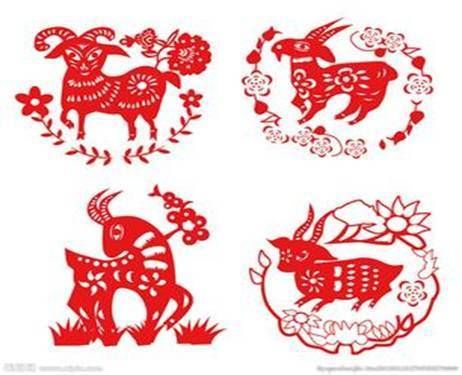老外也纠结 羊年的羊是山羊还是绵羊?(双语)
 羊年生肖
羊年生肖The zodiac animal of China's coming Lunar New Year has caused much confusion in the English world, as its translation results in at least two candidates: sheep or goat.
中国农历新年即将到来,但今年的生肖却让英语国家的人们感到非常困惑,因为它至少有两种英文翻译:绵羊或山羊。
Chinese folklorists say the animal symbol can be either a sheep or a goat but more likely goat, given the latter's popularity as a farm animal among Han Chinese。
中国民俗学家表示,羊年生肖的象征物既可能是绵羊,也可能是山羊,但山羊的可能性更大,因为在汉族地区山羊作为家畜更为常见。
The Chinese lunar calendar assigns an animal symbol to each year in every 12-year cycle. Yet the Chinese character for the eighth zodiac animal is "Yang", which can refer to either of the two ruminants when used without attributes。
中国农历以十二年为周期,每年以一种动物作为象征。十二生肖中的第八个生肖是“羊”,而这个字在没有修饰限定语的情况下可指绵羊或山羊任意一种反刍动物。
Huang Yang, a prominent researcher on the role of sheep/goats in Chinese culture, says tracing the origin of the zodiacal Yang could be difficult, as the Chinese zodiac first appeared after the Shang Dynasty (1600-1046 BC), when the Chinese people did not differentiate between sheep and goats in language or in sacrificial offering。
国内研究羊在中国文化中地位的知名学者黄洋称,追寻生肖羊的来历比较困难,因为此生肖最先出现在商朝(公元前1600-1046年)之后,而那时人们在语言和祭祀中是不区分绵羊和山羊的。
Both species have a long history of domestication in China and have appeared on oracle bone scripts and other artifacts since prehistoric times, according to Huang, who in 2012 challenged the saying that Chinese are "descendants of the dragon" by arguing that the earliest Chinese actually worshipped the meek ruminants。
黄洋称,这两种动物在中国都有着较长的畜养历史,自史前时期开始,就已出现在甲骨文和其他手工艺品上了。黄洋曾在2012年质疑中国人是龙的传人,认为最早的中国人崇拜的是温顺的反刍动物——羊。
"But if we judge from the fact that the Chinese zodiac is a Han tradition, Yang are more likely goats, which are more common livestock for the Han Chinese," he tells Xinhua in a phone interview。
在接受新华社的电话采访时,他表示:“但如果我们基于生肖是汉族传统这个事实出发, 则‘羊’更可能指的是山羊,因为对于汉族人来说山羊是更为常见的家畜。”
Shaggy sheep are a common sight in north China's prairies and were domesticated by Chinese earlier than goats, but goats are more commonly raised in areas populated by Han Chinese, Huang says。
他说,绒毛蓬松的绵羊在中国北方的大草原上很常见,其畜养的时间也比山羊要早,但在汉族聚居地山羊更为常见。
Images on China's zodiac stamps and papercuttings are often bearded goats. The replica of the Yang bronze statue that once formed part of a zodiac fountain in the looted Old Summer Palace also has a goat head。
中国生肖邮票和剪纸上羊的形象往往都是带胡须的山羊。而惨遭洗劫的圆明园生肖喷泉一部分的青铜羊首复制品,也是山羊头。
Fang Binggui, a folklorist based in southeast China's Fuzhou City, says the image of the zodiac Yang is open to regional interpretation. "People depict the zodiac animal based on the most common Yang in their region. So it's often sheep in the north while goats in the south."
中国东南部城市福州的民俗学家方兵贵称,生肖羊的形象常有区域性的解释。他说:“人们基于当地最常见的羊来描绘生肖羊,所以在北方生肖羊往往是绵羊,在南方却是山羊。”
Few ordinary Chinese are troubled by the sheep/goat distinction。
很少有中国百姓因分不清绵羊和山羊感到困扰。
"I've never thought about that question before. Do we have to tell them apart?" asks Chen Xufeng, an office clerk in Beijing。
北京白领陈旭锋说:“我以前从来没想过这个问题。我们有必要区分它们吗?”
"I've seen more goats in zodiac images, but I prefer to buy a sheep mascot, as sheep are more fluffy and lovely," he says。
他说:“在生肖图案里,山羊更常见,但我却更喜欢买绵羊吉祥物,因为绵羊毛茸茸的,非常可爱。”
However, the ambiguity has whipped up discussion in the West. A story run by the Associated Press said this year's animal "is subject to interpretation"。
然而,这个模糊不清的概念却在西方引发讨论。美联社刊文称,今年的生肖动物还有待解读。
"We just had this discussion a few weeks ago. What exactly is it?" AP quoted a worker in Brooklyn Chinatown as saying. "It can be a ram, sheep or goat -- any ruminant mountain animal with horns."
美联社援引布鲁克林唐人街一名上班族的话称:“我们几周前刚讨论过这个问题。今年的生肖到底是什么?它可以是公羊、绵羊或者山羊,只要是山上长角的反刍动物都有可能。”
In England, the Manchester Evening News also posed the question: "Later this month, we will enter the Chinese Year of the Ram. Or should that be sheep? Or even Goat?"
英格兰《曼彻斯特晚报》也提出了这个问题:“月底我们就要跨入中国农历公羊年了,或者应该叫绵羊年?还是山羊年?”
Other media outlets, including Bloomberg, have described the coming Lunar New Year as the Year of the Sheep, Goat or Ram。
其他一些媒体包括彭博社,也已把即将到来的农历新年称作绵羊、山羊或公羊年。
Xiang Daohua, a teacher of Chinese language and culture at China Foreign Affairs University, believes cultural connotations should be taken into consideration in translation。
北京外国语大学[微博]中国语言文化学院教师向道华认为,翻译时应该考虑文化内涵的因素。
"The English word 'sheep' better fits the Yang image in traditional Chinese cultures, which is meek and even a bit weak," he says。
他说:“英文单词‘sheep’(绵羊)更符合中国传统文化中羊温顺、甚至有点柔弱的形象。”

